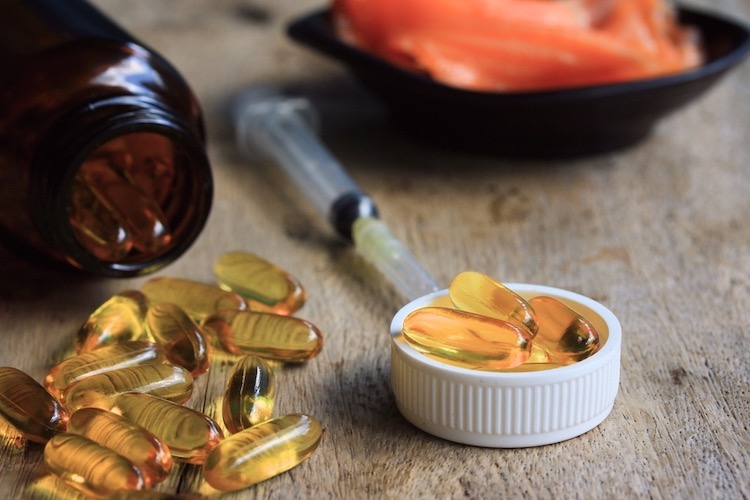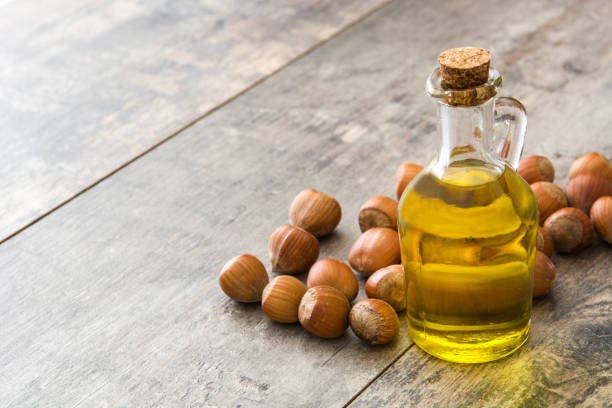Older generations in particular may feel disgust at the memory of fish oil because of its unpleasant aftertaste. Fortunately, current dietary supplements containing fish oil taste much better. However, it is best to take fish oil as part of a balanced and varied diet. Where can we find it everywhere and when should we take it in the form of pills or drops?
Fish oil began to be used for prevention and treatment purposes about 400 years ago. Before that, it was used for other purposes, such as leather treatment and lighting, until people noticed its benefits for human health.
What is fish oil and how does it affect the human body
It contains a large number of health benefits, such as vitamins A and D. The most important of these are Unsaturated omega-3 fatty acids, especially eicosapentaenoic acid (EPA) and docosahexaenoic acid (DHA). The human body cannot produce these on its own, and it is therefore necessary to ensure sufficient intake of them through appropriate foods.
The importance of fish oil for health
Adequate amounts of fish oil, more specifically omega-3 fatty acids protects the heart and blood vessels, promotes their normal function and reduces the risk of cardiovascular disease, such as cardiac arrhythmia, heart attack or coronary artery disease.
These facts are confirmed by numerous scientific studies and empirical evidence. Nations whose diets are particularly rich in fish oil have a statistically significantly lower incidence of heart disease. This is true, for example, of the Eskimos and, in general, of all coastal peoples who make their living from fishing.
Effects on the central nervous system and brain function
Omega-3 fatty acids are essential for normal development and function and therefore should not be lacking, especially in the diet of young children, pregnant and nursing mothers. They protect pregnant women against depression, are important for fetal development and benefit children with behavioural problems (e.g. hyperactivity problems).
Effects on fetal development and child growth
Omega-3 acids in fish oil are essential for proper growth and brain development of the child. She receives them already in pregnancy from the mother from her body and then by breastfeeding. Sufficient intake positively affects the child’s intellect in later years. Yet up to half of mothers have too little DHA in their breast milk.
During pregnancy, the need for DHA increases. Pregnant women are advised to take up to 350 mg of DHA, but most women take no more than 60 mg. It is best to eat oily fish 2 to 3 times a week.
Effects on the brain in adulthood and old age
They are also important in adulthood, when they can alleviate some psychological illnesses including serious diseases such as schizophrenia and Alzheimer’s disease, increase the overall resilience of the nervous system, contribute to mental stability, slow aging and promote cognitive brain function (especially memory and ability to concentrate).
Other health effects of fish oil:
- helps maintain healthy blood fat triglyceride levels,
- regulates blood pressure, improves blood vessel patency and elasticity,
- lowers the level of “bad” LDL cholesterol while maintaining the level of “good” HDL cholesterol,
- may contribute to healthy-looking skin,
- helps with skin problems and diseases,
- relieves menstrual pain,
- It is beneficial for inflammation of joints, intestines, blood vessels or even psoriasis,
- improves the immune system.
Also discussed is its importance in cancer prevention. Some studies have suggested that it may eliminate the risk of breast cancer and colon cancer in particular.
Consequences of fish oil deficiency in Central European peoples
When it comes to a healthy intake of omega-3 fatty acids, the best Mediterranean, Scandinavian and other coastal nations. Marine fishing is one of their main means of subsistence and fish forms an essential part of their diet. Some marine fish are the best source of fish oil.
This is not the case for Central European peoples, whose natural diet is too poor in natural sources of omega-3 fatty acids. The minimum daily recommended intake of EPA and DHA is set at 250 mg.. In case of lower intake, it is recommended to take appropriate dietary supplements containing unsaturated omega-3 fatty acids.

Fish oil and its best sources in food
Fish oil is the main source of omega-3 fatty acids. Most of them contain fatty freshwater and marine fish. It is not necessary to swallow fish oil or tablets by the spoonful. It is enough to eat once or twice a week various types of oily fish, especially trout, tuna, mackerel, sardines, herring or salmon.
Their fat contains the beneficial omega-3 fatty acids DHA and EPA. Unlike white fish fatty fish contain up to 30% fish oil plus they are one of the best sources of vitamins A and D.
They are the best marine fatty fish, specifically mackerel, tuna and salmon. This applies only to fresh or frozen fish. Canned fish contains omega-3 fatty acids in minimal amounts. Suitable sources are still herring and trout.
Cod already contains significantly less than tuna and mackerel. Unfortunately, neither european fish is not a good source. Such carp contain only minimal amounts of omega-3 acids.
Omega-3 fatty acids in plant sources
If you don’t like fish and especially fatty ones, smaller amounts of EPA and DHA are found in some plant sources. These are mainly walnuts, sunflower and linseeds, as well as quality rapeseed and olive oil.
The Central European diet lacks its own sources and some of the more important ones are relatively expensive (e.g. fresh tuna, salmon, virgin olive oil, etc.). It is not surprising that people are deficient in omega-3 unsaturated fatty acids. Dietary supplements offer a solution.
Fish oil in dietary supplements
For many people, eating good quality marine fish on a regular basis is a superhuman task, either because they don’t like it or because it is too expensive for them. In this case, it is advisable to start taking a food supplement.
Not every dietary supplement with omega-3 fatty acids contains both EPA and DHA in sufficient amounts. Always read the product packaging to find out what the acid content is and make sure that one serving of the supplement is equivalent to the minimum recommended daily allowance, i.e. 250 mg.
In what form do you get fish oil:
- liquid fish oils (cod liver oil from Möllers with various flavours)
- fish oil in tablets – wide range of products from different manufacturers (e.g. Vitaland, Farmax, Myprotein, Weider, GS, Dr. Max, Czech Virus, Nutrend, MaxiVita, Walmark, Cemio, Noventis, Benu and others)
How to choose a suitable dietary supplement with fish oil? Get a recommendation from your pharmacist, study the ingredients on the product packaging and also look for reviews on the internet.

Dosage and possible risks associated with taking fish oil
Fish oil can affect blood clotting. Persons with a bleeding disorder taking medication should not take dietary supplements without first consulting their treating physician. The same recommendation applies to persons taking medication for high blood pressure.
Always follow the recommended dosage
The recommended dosage is usually 3 grams of fish oil per day. Do not exceed it. Taking excessive doses of fish oil does not benefit the body, on the contrary, it can cause various unpleasant symptoms such as:
- nausea,
- heartburn,
- diarrhea,
- nosebleeds,
- bad breath,
- weakened immune system.
3 best recipes with fish rich in quality fish oil
Baked mackerel with mango chutney
Ingredients:
- 2 smaller mackerel
- 1 larger mango or mango puree
- 1 chilli pepper
- 1 smaller onion
- 1 red pepper
- 4 tablespoons pineapple juice
- 2 tablespoons white wine vinegar
- 2 cm ginger root
- brown sugar
- pepper, salt
- oil
Progress:
Clean the mackerel, gut them, salt them on the outside and inside and put them in an oven preheated to 180 °C. Bake for 15 to 20 minutes depending on the size of the fish. In the meantime, dice the onion, cut the peppers into equal sized pieces, remove the skin from the mangoes and dice them as well. Finely chop the ginger and chilli pepper.
Heat the oil in a pan and fry the onions. Throw in the chilli pieces and fry until they start to soften. Then add the mango and season with ginger and finely chopped chilli. Pour in the pineapple juice and wine vinegar, add a tablespoon of brown sugar and simmer for about 20 minutes. Finally, season with salt and pepper.
Serve the spicy mango sauce with freshly baked mackerel and basmati rice.
Couscous with tomato salsa and tuna
Ingredients:
- 250 g couscous
- 2 fresh tuna steaks
- 1 red onion
- 1 lime
- 2 tablespoons basil
- 2 tablespoons parsley
- 2 tablespoons coriander
- 2 cloves garlic
- 1 red pepper
- 1 chilli pepper
- 2 tablespoons pine nuts
- 6 tomatoes
- 2 tablespoons olive oil
- salt and pepper
Procedure:
First, prepare the couscous according to the instructions on the package. Heat a frying pan and dry roast the pine nuts.
Remove the centres from the tomatoes, remove the seeds from the chilli, peel the red onion and chop everything, including the red pepper, into small pieces. Chop the herbs. Mix everything together and add the crushed garlic, basil, coriander, parsley, nuts, a pinch of salt and pepper, fresh lime juice and olive oil. Toss the tomato salsa with the pre-prepared couscous.
Heat a clean frying pan and sear the tuna steaks in a little oil for one to two minutes on each side as you like it. Serve with the finished couscous.
Baked salmon with seeds and salad
Ingredients:
- 2 salmon fillets
- 4 tablespoons honey
- a mixture of sunflower and pumpkin seeds
- salt and pepper
For the salad:
- 8 small mandarins
- 100 g of lamb’s lettuce
- 250 g beetroot
- 2 tbsp olive oil
- 1 tablespoon red wine vinegar
Procedure:
Preheat the oven to 200 °C. Coat each salmon fillet with one teaspoon of honey, season with pepper and press a quarter of the seed mix onto each. Transfer to a baking tray and bake for about 15 minutes.
Meanwhile, prepare a salad as a side dish. Peel the mandarins and divide them into pieces. Mix the juice of the mandarins with oil, wine vinegar, salt and pepper. Peel the beetroot and cut into small pieces. Gently toss with the chard and mandarin oranges, drizzle with the dressing and serve with the roast salmon.

Eat fatty fish twice a week and save money on pills
Why is fish oil important?
- It contains unsaturated omega-3 fatty acids, essential for proper brain development, for example.
- It protects the heart and blood vessels and reduces the risk of cardiovascular disease.
- It promotes mental resilience and health and slows the signs of aging, including diseases that can accompany old age.
- It has antidepressant effects and helps children with behavioral disorders.
- Helps maintain healthy blood fat, blood pressure and cholesterol levels.
- It also has a positive effect on the appearance and health of the skin and can help with skin problems.
- It is also important for immune system function.
Read also:
- How do I check my gastrointestinal function?Stomach pain, constipation or diarrhea, bloating, belching, heartburn? These are all symptoms of problems in the gastrointestinal tract. It starts with the mouth and esophagus and ends with the intestines and rectum.
- What are the benefits of hazelnut oil for the skin?Hazelnut oil is rich in vitamins and essential fatty acids that nourish the skin. Here are a few reasons why you should add this oil to your skin care routine.
- Immune-boosting aromatic oilsThere are many products and treatments that can help your body to build a natural resistance to the harsh winter months, and aromatherapy is one of them. There are many studies supporting the healing power of aromatherapy and it is good for both mental and physical health. Aromatic essential oils also have many health benefits… Read more: Immune-boosting aromatic oils
- Marula Oil Benefits, Uses, and PrecautionsMarula Oil is an exotic oil that comes from the African Marula tree. It’s a good ingredient for skin, hair, and nails. Learn more about the benefits and precautions of Marula Oil with our guide.
- Goal setting for students, children and young peopleRemember when you learned how to set goals? If you have trouble answering this question, you are not alone! Most of us don’t spend much time thinking about how we set our goals. In fact, many of us don’t even think of goal setting as a skill; rather, it’s something we do without much thought.… Read more: Goal setting for students, children and young people
The articles on this site are for information purposes only. The site administrators are not responsible for attempting to apply any recipe, advice or diet, nor do they guarantee that the information provided will help or harm you personally. Be cautious and always consult a doctor or nutritionist!
*All products recommended are selected by our editorial team. Some of our articles include affiliate links. If you buy something through one of these links, you help us earn a small commission from the seller and thus support the writing of useful and quality articles.










